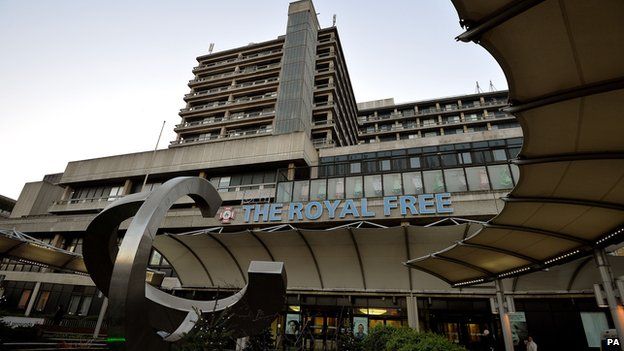UK healthcare worker returns for Ebola monitoring
- Published

A British military healthcare worker has been flown back to the UK from Sierra Leone for Ebola monitoring.
The individual suffered a needle-stick injury while treating a patient in the West African country, which is among those affected by the Ebola outbreak.
The person has been admitted to the Royal Free Hospital in north London, Public Health England (PHE) said.
More than 22,000 people have been infected with Ebola and 8,795 have died in Sierra Leone, Guinea and Liberia.
The individual, who is being treated in isolation, does not have symptoms but is likely to have been exposed to the virus, the Royal Free said.
The patient arrived back in the UK on Saturday on board an RAF flight and will be monitored for the remainder of their 21-day incubation period.
'Well-tested protocols'
Professor Paul Cosford, PHE's director for health protection, said: "Our thoughts are with this person, who has been courageous in helping those affected in West Africa, and in preventing the wider spread of Ebola.
"We have strict, well-tested protocols in place for this eventuality and we are confident that all appropriate actions have been taken to support the healthcare worker concerned and to protect the health of other people."
Needle-stick injuries involve a piercing of the skin by a sharp instrument or object, typically a needle.
Jonathan Ball, a professor of molecular virology at the University of Nottingham, said such injuries were "one of the most dangerous risks for infection" as the virus could be delivered directly into the bloodstream.
"Careful monitoring and Ebola virus testing will determine if the person has been exposed and infected," he added.
The Royal Free is home to a specialist unit for infectious diseases patients.
Two other Britons who contracted the virus - nurses Pauline Cafferkey and Will Pooley - have been successfully treated there, both of whom had worked in West Africa.
Ms Cafferkey was discharged last week. She said she was now looking forward to returning to "normal life" and had no current plans to return to West Africa.
She was treated with blood plasma from an Ebola survivor and an experimental treatment drug closely related to ZMapp, which Mr Pooley was treated with after he contracted Ebola.
Up until 5 January the Imported Fever Service (IFS) - which is a specialist diagnostic service for medical professionals managing travellers who have returned to the UK with fever - said it had received 258 calls regarding Ebola, and 148 tests had been carried out, with only two confirmed cases of the virus.